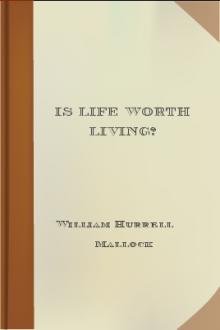Analyzing Character, Arthur Newcomb [popular romance novels .txt] 📗

- Author: Arthur Newcomb
- Performer: -
Book online «Analyzing Character, Arthur Newcomb [popular romance novels .txt] 📗». Author Arthur Newcomb
TALENT IN THE BUD AND BLOSSOM
The big important lesson underlying all of these concrete examples is that the individual of this type never ought to attempt to do any kind of work in which success depends upon physical effort. Whatever talents he may have will express themselves always best in an intellectual way. It may be art, it may be music, it may be machinery, it may be business, it may be mining or agriculture, it may be any one of many other active pursuits which have also a purely intellectual side. In his early youth his mind naturally turns to the more material manifestation of his talent. But, with proper training and given the proper opportunities, he will always gravitate surely to the mental and intellectual phases of his bent. The boy who is interested in machinery may become an inventor or he may become a playwright or an author. The boy who is interested in plants and flowers may become a botanist or a naturalist, or, perhaps, even a poet. The boy who is deeply interested in battles and fighting may be far better adapted to the profession of historian than to the trade of soldier. The boy who likes to build houses and factories in his play, and seems to be deeply interested in the construction of edifices, may not be fitted to become a contractor or a draughtsman. If he is of this intellectual type, he is far more likely to become an architect, or, perhaps, to idealize his talents even further and devote himself to literature on the subject of architecture, home planning, and home decoration. The boy of this type, who in his youth seems to take a particular interest in horses, cattle, dogs, and other animals, may not necessarily be best qualified for a stock breeder or a dairyman. Possibly he should become a veterinarian or even a physician and surgeon. Or his bent may be in the direction of science, so that he makes a name as a naturalist.
The first and most important thing for people of this type, and for parents having children of this type, is to get it firmly fixed in their minds, once for all, that they are not fitted for hard physical work. The next important thing, of course, is to secure a broad and complete education along general lines. If there is any striking and particular talent along any one line, such an education is more than likely to bring it out and to cause it to seek further development. In case there is no such distinct predilection manifested, further and more minute study of the individual will have to be made in order to determine just what kind of intellectual work will give him the best opportunities for success and happiness. Even in the want of such a careful analysis, it is, nevertheless, true that an individual of this type, who has no marked inclination toward any one form of mental activity, is always far better placed, far happier, and far more successful if trained to do any kind of intellectual work than if left untrained and compelled to try to earn his own living by the use of his bones and muscles.
CHAPTER V THE FAT MANWhen we were children and went to the circus, our favorite performer in the sawdust ring was always the clown, and our favorite clown was the fat one. In fact, we do not remember ever having seen a clown who was not a fat man.
Alas! how many were the tribulations of our rotund friend! How he was buffeted, and paddled, and slapped! How often he tumbled and fell! How maliciously inanimate objects flew up and hit him in the face! How constantly his best efforts went for naught, how invariably he was misunderstood! How great was the glee with which everybody persecuted him and knocked him about the ring! And yet, notwithstanding all his troubles, did he win from us a sympathetic sigh or even the fraction of a tear, except tears of laughter? All his troubles seemed funny to us.
Millions are still laughing at the comic tribulations of dear old John Bunny, although he has gone beyond the power of things to trouble him. We have laughed and are still laughing at Thomas Wise. From the days of Falstaff down to those of the "movies," we have enjoyed laughing at the plights of a fat man on the stage.
FAT MEN RULE THE WORLD
In real life it is much the same. Every fat man knows that only by unusual patience, good nature, and friendly tolerance can he live with his fellows. He is the butt of all jokes; he must smile at a constant patter of pleasantries about his unusual size. He hears the same old stupid japes over and over and over again. If he weren't the prince of good fellows and the best-natured man in the world, it would fare ill for those who torment him.
As a matter of fact, it may be better for the rest of us than for the fat man that he is good natured, easy going, genial, fond of a good laugh; because fat men rule the world. Perhaps that is why it is so funny to us to see them in trouble. It is one of the foibles of humanity always to find pleasure in the mishaps of its rulers and superiors. The pranks of the schoolboy are intended to cause perplexity and distress to his teacher. This is true of the college youth in his playfulness. The same human trait manifests itself in a thousand other ways.
The fat man was born to rule. He enjoys the good things of life. He is fond of luxuries. He has a keenly developed sense of taste, and a nice discrimination of flavor. He likes to wear good clothing. He likes soft, upholstered chairs, comfortable beds, a goodly shelter. Like old King Cole (always pictured in our nursery books with a Garguntian girth), he enjoys "his pipe and his bowl and his fiddlers three." He is fond of a good joke, and laughs more heartily than any one else at it. In fact, enjoyment and pleasure may be said to be the keynote of the typical fat man's personality. But he is too heavy for physical activity. His feet are too small for the weight of his body. He does not care for strenuous physical exercise. It is not his idea of a good time to follow a golf ball all over a twenty-acre field. He does it only because he thus hopes to reduce his flesh and enable himself to become once more the romantic figure he was in his youth. For, while the fat man may be a master of comedy, and while he may be a ruler of the people, he is not romantic. The big fellows do not well sustain romantic rôles, except in grand opera, where nearly everything but the music is illusion and elusive. Our novelists all tell us that as soon as a man's girth begins to increase, he looks ridiculous in a fine frenzy. J.M. Barrie makes a very keen point of this in his story of Tommy and Grizel. It was the increasing size of his waist band that drove poor Tommy to such extreme measures as to cause his final downfall and death. His one great aim in life was to be romantic, and when the lady of his desires giggled about his increasing size it was too much.
Scientific research, philosophy, and the more strenuous and concentrated forms of mental activity seem to require a certain degree of asceticism in order to be wholly efficient. We are told that the person who feeds too well causes his mind to grow rather ponderous in its movements. He is inclined to fall asleep if he remains quiet and practices severe mental concentration for too long a time.
HE PLANS WORK FOR OTHERS
If, therefore, the fat man cannot work at physical labor, if he is not fitted for romance, if he is incapacitated by his love of the good things of life for severe mental labor, what can he do to fill his purse, supply his table, clothe his portly person, and surround himself with the elegancies and luxuries which are so dear to his heart?
Evidently the fat man found out long ago that the eager, active, restless, energetic, muscular, raw-boned soldier and workman was far more interested in the exercise of his muscles and in outdoor activity than he was in securing niceties and luxuries. He also learned that the thinker, the philosopher, the scientific experimenter, and all who took delight in mental effort were more deeply interested in their studies, in their research, in their philosophies, and in their religions than they were in money, food, clothing, and shelter. So he set about it, with his jovial personality, his persuasiveness, and keen sense of values, to organize the thinkers and philosophers under his direction, so that he could take and use for himself the product of their mental labors. He was perfectly willing to agree to feed and take care of them, to clothe and shelter them, in return for what they could give him. They didn't eat much. They didn't care much for fine clothing. They were perfectly satisfied in very plain and rather ascetic surroundings. They were, therefore, a rather inexpensive lot of people for him to keep.
Taking the plans, schemes, inventions, and discoveries from those who thought them out, the fat man carried them to the muscular fellows, who were just spoiling for a fight or for some opportunity to exercise their physical powers. These he organized into armies—to fight, to till the soil, and to build and manufacture. These armies carried out the ideas the fat man got for them from the lean and hungry thinkers. They gloried in hardship. They rather enjoyed roughing it, and took delight in privation. Therefore, they also were a comparatively easy burden on the hands of the fat man; who was thus enabled to sit upon a golden throne, in a comfortable palace, surrounded by all the beauties and luxuries gathered from the four winds, and enjoy himself while directing the work of both the intellectual giant and the physical giant.
THE SLENDER SCHOLAR AND THE RUGGED SOLDIER
Kant, Schopenhauer, Hegel, Spencer, Emerson, and Bergson were philosophers, and were all lean and slender men. Lord Kelvin, Lister, Darwin, Curie, Francis Bacon, Michelson, Loeb, Burbank, and most of our other scientists are also of the thin, lean type. Shakespeare, Longfellow, Holmes, Ruskin, Tindall, Huxley, and a long list of other intellectual and spiritual writers were men who never put on much flesh. James Watt, Robert Fulton, Elias Howe, Eli Whitney, S.F.B. Morse, Marconi, Alexander Graham Bell, the Wright Brothers, and nearly all of our other great inventors have also been men whose habit was slender. Alexander, Napoleon, Washington, Grant, Kitchener, and most of our other great soldiers, while robust, are of the raw-boned, muscular type. They do not belong in the list of the fat men. The same is true of our great railroad builders, of Stanley, Peary, Livingston, and other explorers, of De Palma, Oldfield, Anderson, Cooper, Resta, and our





Comments (0)